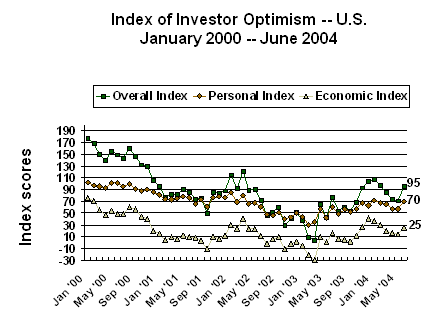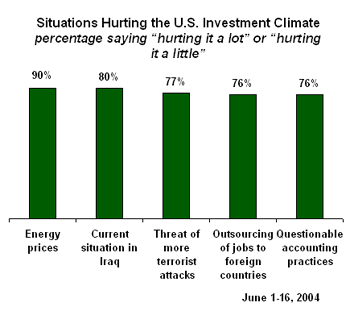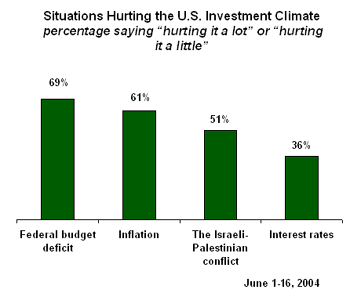GALLUP NEWS SERVICE
PRINCETON, NJ -- Six in 10 investors say inflation is a serious problem and 9 in 10 say the price of energy, including gas and oil, is hurting the investment climate, according to the June UBS/Gallup Index of Investor Optimism survey. Even more significantly, nearly half of all U.S. investors are worried that inflation will hurt their investment portfolios.
So, why did June investor optimism reach its highest level in four months? And, why do nearly two in three investors oppose higher interest rates?
The answer may be that we need to put the current level of investor optimism in proper perspective. Even as the economic expansion has finally begun to create a significant number of new jobs, investor optimism has only returned to its February level and remains below where it was in December and January.
Market participants, business executives, and the Federal Open Market Committee -- as it meets Tuesday and Wednesday to consider increasing interest rates -- should keep this need for "perspective" in mind as they evaluate the economic outlook for the second half of this year. Even after its surge in June, investor/consumer optimism about the economy remains far below that of most economic forecasters.
Investor Optimism Surges
The Index of Investor Optimism increased 24 points in June and now stands at 95, essentially matching its February (97) and November (93) levels. While the Index is now significantly higher than it was a year ago (77), it remains below its December (104) and January (108) levels. The Index peaked at 178 in January 2000 and reached its low of 5 in March 2003.
The Personal Dimension increased 13 points in June, reaching 70 -- its highest level since January (72) and its second-highest level since March 2002. In June, investors became more optimistic about their ability to achieve their investment targets and investment goals, and to maintain or increase their income.
The Economic Dimension increased 11 points in June to 25 -- its highest level since February (30). Investors are now more optimistic about economic growth, unemployment, and the stock market. Still, investor optimism about the economic outlook remains well below where it was in December (41) and January (36).

Factors Hurting the Investment Climate
In June, the top concern of investors continues to be the price of energy (including gas and oil), with 90% saying it is hurting the current investment climate "a lot" (62%) or "a little" (28%). Eighty percent say the situation in Iraq is hurting the current investment climate "a lot" (47%) or "a little" (33%).
Three in four investors also say that the threat of more terrorist attacks, the outsourcing of jobs to foreign countries, and the issue of questionable accounting practices in business are hurting the investment climate "a lot" or "a little."

Sixty-nine percent of investors say the federal budget deficit is hurting the investment climate "a lot" or "a little." Investors express less concern about inflation (61%), the Israeli-Palestinian conflict (51%), and interest rates (36%).

Why Is Investor Optimism Increasing?
The Personal Dimension of the Index shows that investors are increasingly optimistic about their own financial situations and their incomes over the next year. Investors have done well over the past year, and they are becoming more confident that they will continue to do so in the months ahead.
The improvement in the Economic Dimension reflects, at least in part, the fact that two in three investors now recognize that the economy is in the midst of a recovery or an expansion. It also reflects the much-improved job numbers of recent months and increased investor optimism about the stock market. Of course, this improvement in optimism is being tempered by all the investor worries discussed earlier -- particularly investors' relatively new concerns about inflation and higher interest rates.
Significantly, these investor perceptions seem to parallel those of many consumers. Gallup's economic measures show a significant increase in consumer confidence in June, with many more consumers rating current economic conditions as good or excellent than did so in May. Still, consumers -- like investors -- are less enthusiastic about the direction of the economy in the months ahead.
Why Do Investors Oppose Higher Interest Rates?
Putting today's investor optimism and consumer confidence in perspective, the better question may be, "Why have investor/consumer perceptions been so slow to improve?" For consumers, the answer seems to lie in the way the current economic expansion has combined with much higher energy prices to lessen the financial well-being of many lower- and middle-income Americans.
As far as investors are concerned, the answer probably has more to do with their fears of inflation and higher interest rates. Price stability and historically low interest rates have been good for the economic recovery and for most investors. The transition to an inflationary environment and higher interest rates presents some significant risks to the strength of the economic expansion -- particularly next year. More importantly, however, inflation and higher interest rates will significantly reduce the value of the bond -- and similar long-term investment -- holdings of many investors.
Bottom Line
Today's investor optimism and consumer confidence data suggest that the current economic expansion remains much more fragile than is generally perceived. At the same time, the transition to a more inflationary and higher interest-rate economy represents a serious challenge for economic policymakers. As a result, there is greater reason to be cautious about the economic outlook in the months ahead than the growing euphoria among the professional traders in the equity markets would suggest.
Survey Methods
Results for the Index of Investor Optimism -- U.S. are based on telephone interviews with a randomly selected U.S. sample of 802 adult investors, aged 18 and older, with at least $10,000 of investable assets, conducted June 1-16, 2004. For results based on this sample, one can say with 95% confidence that the maximum error attributable to sampling and other random effects is ±4 percentage points. In addition to sampling error, question wording and practical difficulties in conducting surveys can introduce error or bias into the findings of public opinion polls.

